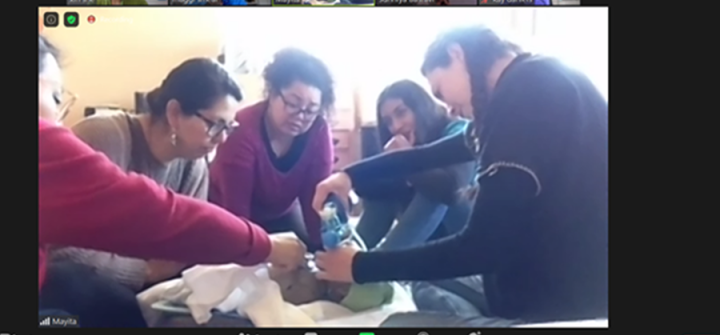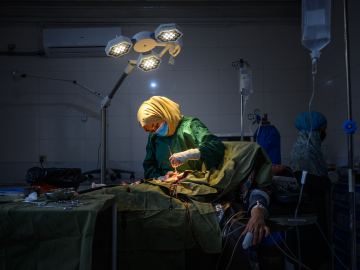The Untold Global Health Story of 2021: The Midwives of Tijuana
Most midwives in Tijuana, Mexico weren’t used to delivering high-risk pregnancies—but that changed when hospitals began rejecting pregnant mothers, citing COVID-19 restrictions. One midwife, as a result, saw her first newborn death after 35 years of practice.
Their experiences moved Xin She, MD, MPH, to share the story of the midwives. Her idea was selected as the winner of the 2021 Untold Global Health Stories contest, sponsored by the Consortium of Universities for Global Health and Global Health NOW.
She, a Stanford University clinical assistant professor, described the heartbreaking crisis caused by 70,000+ refugees denied the right to apply for asylum in the US during the pandemic—including pregnant women forced to deliver their babies in shelters. “During these difficult times, we should advocate for basic health access in the most vulnerable populations, and not allow our governments to use a pandemic as an excuse to deny human rights,” She wrote.
In this Q&A, She tells GHN about her work with the midwives and the lessons they can offer the global health community.
What inspired you to help the midwives?
Devastating stories about kids being separated at the border from their parents and siblings—not even allowed to hold on to their stuffed animals—really caught my attention. As a pediatrician and mother, that struck me as unacceptable and inhumane.
I joined Stanford’s Families at the Border group, which supports asylum seekers with fundraising, advocacy, and clinical support—including for midwives working with high-risk pregnant women in Tijuana—in partnership with several local and international NGOs.
I had done similar work as a Partners fellow in Health in Haiti for 2 years—so I happen to speak Cajun Creole, as well as Spanish. When I heard that 40-80% of the women in the shelters served by the midwives spoke Creole, I really wanted to help.
What are the midwives in Tijuana going through?
I was in Tijuana right before the pandemic, and it’s such an interesting city—growing by roughly a block a week, a friend who lives there told me. In the US, overwhelmed with COVID, we didn’t have the extra bandwidth to hear this—but Mexico, a middle-income country, was under a lot more stress. No city has the capacity to expand at that pace and absorb that many extra people.
And then, COVID happened. Most of the midwives are very skilled—but typically focused on delivering full-term, healthy babies. When local hospitals started turning patients away, the midwives stepped in and took on even high-risk deliveries—while the volume of patients increased by up to 300%.
We provided virtual training, focused on neonatal resuscitation in low-resource settings, as well as materials. But when we heard the midwives’ stories, we realized how desperate the situation is, and that we’re probably just scratching the surface.
You’d done similar work before–but did this experience change you in a different way?
It’s always inspiring to see how people work under extraordinary circumstances. The midwives make our lives seem so easy—even when our entire country is going through hard times because of COVID. Just hearing their story put so many things in perspective.
I asked the midwives what keeps them going—they’re not paid for overtime; they work for NGOs and don’t earn a living wage. They’re doing this extra work out of the goodness of their hearts.
And interestingly, I didn’t see the usual signs of burnout. I work a lot with doctors, nurses, and trainees, and burnout is an issue everywhere, including in the US. Instead, these midwives told us they’re grateful for the opportunity to help the refugees. That gratitude creates almost a protective aura around them. Not to say it’s easy for them, but they’re able to find something positive. It’s a calling for them.
We often forget that it’s a privilege to work in health and help people who might not have access to care otherwise. In these extreme circumstances, that’s a lesson we can all learn from.
How could a spotlight help these patients and midwives?
The refugees’ plight has been overlooked for years; we’re just seeing the ultimate culmination between COVID and the lack of a safe asylum-seeking process. I think the more media attention, the more the public will put pressure on the [Biden] administration to accelerate the legal processing of asylum seekers. These are vulnerable populations who have suffered from trauma and violence, including families, young people, pregnant women. They should be prioritized and sheltered humanely.
For the midwives, I’m hoping they’ll get more support— well-deserved recognition, fair pay, more materials, and safe, effective hospital referral support for high-risk moms.
What can the global health community learn from the midwives?
The global health community can see how wonderful many practitioners are in humanitarian settings. The midwives are mostly Mexican, but the patients are not—they’re from across Latin America, the Caribbean. The midwives weren’t obligated to take these patients, but they did, and they need to be acknowledged. I’m sure we under-recognize local and mid-level practitioners—bedside nurses, midwives, ambulance drivers—who shoulder the heaviest load. We need to give them more credit, learn what they need—and learn from them.
When I was younger, I remember thinking I was going off somewhere to help people—but the more experience I gain, I always feel this sensation that I’m learning as much as they’re learning—we’re just learning different things. They’re learning technical skills. But we cannot teach them how to work in underpaid, under-supported circumstances. They have a lot to teach us about their resilience and endurance in physically and mentally exhausting situations. That’s what really struck me about this experience—how much we have to learn from them, including about mental health. If they’re able to do it, there’s no excuse.
Ed. Note: This Q&A has been edited for clarity and length.
Join the 50,000+ subscribers in 170+ countries who rely on Global Health NOW summaries and exclusive articles for the latest public health news. Sign up for our free weekday enewsletter, and please share the link with friends and colleagues: https://www.globalhealthnow.org/subscribe
Midwives in Tijuana, Mexico receive clinical support via Zoom. Screenshot courtesy of Xin She





